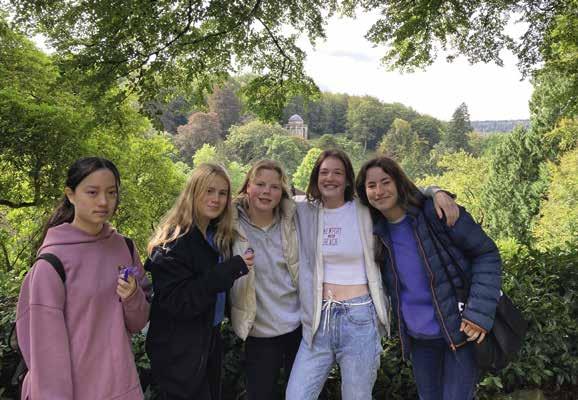
32 minute read
CHAPLAINCY REPORT 2021
You did not choose me, no, I chose you; and I commissioned you to go out and to bear fruit, fruit that will last. St John 15: 16.
Then he took bread, and when he had given thanks, he broke it and gave it to them, saying, ‘This is my body given for you; do this in remembrance of me.’ St Luke 22: 19
“The greatest disease in the West today is not TB or leprosy; it is being unwanted, unloved, and uncared for. We can cure physical diseases with medicine, but the only cure for loneliness, despair, and hopelessness is love. There are many in the world who are dying for a piece of bread but there are many more dying for a little love. The poverty in the West is a different kind of poverty -- it is not only a poverty of loneliness but also of spirituality. There’s a hunger for love, as there is a hunger for God.” St Teresa of Calcutta
This year’s report, September 2020 to July 2021, covers the period of lockdowns with the many restrictions in the way we have had to function. Much of the Lent term took place with no pupils at Downside, all classes and activities being conducted online. The Sunday online service, as well as the Friday afternoon online hymn practice and assembly, became part of school life. It was good that we were able to return to the Abbey Church for the Sunday Mass towards the end of the academic year. We had to adapt the way we delivered retreats and the way the House prayers were conducted.
Amidst all the changes in order to meet the requirements of Covid-19, the life of prayer and service, the love of God and neighbour, have continued, and pupils have adapted to the changing circumstances with goodwill and humour. The Communities of Saints John, Luke and Teresa of Calcutta The three quotes at the start of this report are from the gospels of St John and St Luke, and from St Teresa of Calcutta. These three saints are the patrons of the three communities at the heart of the spiritual life of the School. The three communities have continued functioning and have adapted in the way they have had to meet regularly and reach out to others.
The members of the Community of St John’s are all lectio leaders in the School. The community is led by the St Scholastica Community, the members of the Manquehue Apostolic Movement, who do so much to encourage, support and listen to all pupils in their spiritual journeys.
The many lectio groups across the School meet on a weekly basis to reflect and pray the scriptures. During the meetings all listen with the ear of their heart to God’s word and often share with the others a verse that has resonated with them. Over time the members of the Lectio group grow in friendship with each other as they learn to listen to one another and share what the Word of God is saying to them.
What is Lectio Divina? Lectio Divina is an ancient monastic way of praying and opening oneself to be challenged by the Word of God. It is about stepping out of time and shutting out the noise, bustle and the hundred and one cares of the world so that God can reach me, God can rest in my heart, and I can then listen to him. Lectio Divina is about looking for the living Christ, having contact with the living word, and when one has found and made contact with the living word, enjoying and savouring it.
Enzio Bianchi in a little book – Lectio Divina – Scripture and Community Life – writes, ‘as we read the Bible, our listening should turn into prayer: prayer should accompany the reading of Sacred Scripture, so that God and man may walk together’. Listening is how this dialogue begins. Then, as we expose ourselves to the text and apply it to our lives, new life is breathed into the Bible and the result is genuine theology: not so much speaking
about God as speaking to God, answering his word. Augustine tells students of the Bible that they need to ‘recognize the various kinds of expression in holy Scripture…notice and memorize the ways in which it tends to say things.’
During the Lent Term one of the high points was the moving Open Lectio for staff and pupils organised and put together by the St John’s Community. It was a true ‘Celebration of the Word’ with music, readings, each presided by a pupil with a motivation and other special prayers. This event was entirely pupil led and provided the members of the St John’s Community with valuable work to take part in.
Comments from staff Please pass on my thanks to everyone involved. It was wonderful to be part of the event and very uplifting. The faith and conviction of those in St John’s is inspiring and provides powerful encouragement to all of us at this time. God is very definitely speaking to us and giving us strength and confidence. Thanks again. Best wishes, In Christ, Andrew Hobbs I thought the whole event was put together so thoughtfully. It was so encouraging to hear our students express such wisdom and confidence in their faith. Thank you to all of you for providing us with spiritual food. Best wishes, Jamie Clark
I really enjoyed participating in the Light Your Lockdown event yesterday. It was a wonderful opportunity for everyone in the community to come together at the end of this challenging half term. It was so well organised by the pupils, and I loved the artwork! I would be very pleased if you could share this with the pupils in your next meeting. Best wishes, Catherine Dietrich
The St Luke’s Community has a Lower Sixth Form representative from each House, two members from the Upper Sixth Form who lead the Community with the Head Server. The community is responsible for the organisation of the Sunday mass in the Abbey Church, as well as House masses, House reconciliation services and the House prayers. This help involves organising the readers, welcome
ministers, and the tidying up of the Abbey Church at the end of mass. All meetings start with a few minutes of prayer and lectio. The selected passage for the lectio is always from St Luke’s gospel or the Acts of the Apostles. As restrictions ease, it is hoped that the St Luke’s Community will be able to take a more active role in the organisation of the Sunday Mass in the next academic year. It was good to have a limited number of servers at the masses at the end of the Summer Term and at the Confirmation.
The St Teresa of Calcutta Community also meets every week, and it begins with a few moments of prayer and lectio. The members of the community are drawn from the Upper and Lower Sixth Forms. The community have been active in a number of projects, following an initial motivation at the start of the academic year of ‘Washing each other’s Feet’ as Christ did in the Gospel. Money has been raised for Mary’s Meals with a ‘Silly Sock Day’ and the School took part in the CAFOD – Harvest Day. Two pupils, Judetta Whyte and Marta Resiak, both in the Upper Sixth Form, have taken part in the CAFOD Young Leaders Leadership Skills Course. The School, spearheaded by the St Teresa’s Community, is strengthening its links with St Nicholas Tolentino Church in Bristol and the Community of the Sisters of the Church also in Bristol. With the assistance of the St Scholastica Community, links are being forged with San Lorenzo School in Santiago, Chile, and it is hoped to raise money for the School in this poor district in Santiago. The community have reached out to others with a weekly podcast, with the themes of Hope, Joy, Courage, Service and Love; they have also sponsored and led the Month of Service.
Just before the summer half term the Three Communities shared a barbecue in order to recognise their spiritual leadership in the School. Four members, two boys and two girls, of the Upper Sixth Form gave powerful and moving testimonies about their faith and time at Downside: how Downside had helped them in their journeys of faith. It was a privilege and a truly humbling experience to listen to them. As I come to the end of my time at Downside, I have been reflecting on how my time here has allowed me to grow. What particularly stands out is how it has allowed me to grow in my faith. I have come to understand how faith, rather than being blind, lets us see fully. Without the Catholic faith we are not able to see reality fully as Christ is not in the equation.
This is something I say because I have discovered for myself in prayer, particularly in Lectio. Each time I encounter Christ in Lectio, I see the world in a new light and with greater clarity, coming to see more clearly the truest need of the world and how I am called, as every Christian is, to help fulfil it.
One passage that has really stood out to me throughout my time at Downside is Luke 4:16-21, where Jesus reads from the Prophet Isaiah, ‘’The spirit of the Lord is upon me’’. It has helped me to understand that the greatest need of our world is Christ. Without Christ we are poor, we are blind, we are captives. It reminds me that I am called to action, the spirit of the Lord is upon me, he has sent me.
But it is not just me, it is each one of us who is called in their own unique way to bring Christ to a world that desperately needs him. One of the most powerful ways in which we can fulfil that need is by speaking of our knowledge and experience of Christ in the Sacraments, the scriptures and in the service of others.
Owain Daley Upper Sixth Form – Roberts
Raise your hand if you know how to pray. Well, I have to be honest, and it may make me look like an intruder, but I haven’t the faintest idea of how to pray. No clue. I have prayed! And I’ve said the Our Father and the Hail Mary, I’ve prayed for things and people that I care about, prayed for God’s help when I have needed it and given thanks to him. So yes, I have prayed in a way, and I know a basic layout. But no idea HOW to pray. On Tuesday in St Teresa Community, we reflected on a reading from the Letter of St Paul to the Romans 8:26 – 30, and I was particularly struck by the verse, “we do not know how to pray as we ought” and for a second,
I related so much to it as I have no idea how to pray. Do I then start by saying, Dear Father thank you for the day you have given me; I’d like pray for....; Or casual, hey Father how you are you doing? Cheers for the day, I’m so grateful. I have no clue, I know nothing about God, I haven’t seen him I don’t know what he’s like; it’s a big step into the darkness. Lectio, however, is a great alternative to prayer, and it has helped me learn how to pray with other people in a community, which is a really important part of Christianity.
Alexander Harwood Upper Sixth Form – Barlow
During Lent three pupils gave impressive talks to the School at the Friday hymn practice: Judetta Whyte from Isabella – Upper Sixth Form – spoke movingly from the heart about service: the importance of reaching out to others, especially to those in need of help.
Owain Daley from Roberts – Upper Sixth Form and Wiktoria Lassak from Isabella – Upper Sixth Form, both joint leaders of the St Luke’s Community, challenged the School about praying, fasting and almsgiving during the sacred season of Lent. Owain spoke right from the heart, without notes, about prayer and how Lectio Divina was at the centre of his life and how this form of prayer had deepened his relationship with God.
Wiktoria gave us a well thought out exposition of fasting and almsgiving. I quote a few paragraphs from her talk.
Fasting should be understood by us as giving up a good thing for the sake of a better thing, or actually what Mr McNamara said really wisely, taking something on, most preferably something important to us. Why would we do that?…
As Christians we should focus on another meaning of fasting. Fasting for us is sacrifice. And sacrifice is oriented towards worship. Pope Benedict XVI said, ‘The heart of all worship is sacrifice.’ We shall sacrifice the legitimate pleasure of ours to give something to God. To show Him our love. The day we fast, becomes the entire day of worship, when we sacrifice the short moments of pleasure for God’s love…
Some people fast to show repentance or to identify with those who don’t have anything, which are decent reasons. But it has very much inspired me when I heard once that through fasting each one of us can become a co-redeemer with Jesus. I couldn’t believe someone would actually jump to this kind of a bold statement, but let me explain to you, how it is understood and why would anyone say such a thing. In St Paul’s letter to the Colossians, chapter 1, he says ‘I rejoice in my sufferings for your sake and in my body, I am making up for what is lacking in the sufferings of Christ for the sake of His body, the Church.’ Then, John Paul II, the Pope from Poland asked once a question: What could possibly be lacking in the sufferings of Christ? The answer is nothing. The suffering of Christ is full and complete. But he also says, that so we all could experience the ability to redeem the world with Jesus, Jesus extends us a small particle of His cross. It means, we as Christians, in all kinds of suffering, so also in fasting, we have an ability to unite that suffering to the cross of Jesus Christ for the actual salvation of the world. We are not doing it for ourselves only, but for others as well. That’s why we fast. But that’s also why we give alms…
Another element of Lent is almsgiving, giving others and not leaving it to ourselves. I find it an incredibly powerful weapon that can do so much good but that is also very often forgotten as most of us focus on fasting and prayer as the main points we think we should tick on the list of the things to do over this special time of the year. Well, it is not that simple. There are so many reasons, why almsgiving is as important as fasting and prayer and I would like to present you how they can be understood…
The last reason I want to mention that inspires us to give alms not just over Lent time, but throughout the whole year, is simply the model that we have in Christ. In the second letter to the Corinthians, chapter eight from St Paul we read “He, who was rich, made himself poor for your sake.” Isn’t that beautiful? He, who was rich, decided to give up all He had, for us, for his children, as we are the children of God. Having such an example, we should want to be conformed to Jesus
Christ, not just in our prayer, not just in our fasting, but in a sense of impoverishing ourselves for others…
I hope you will feel empowered to make the right decisions this Lent, that you feel inspired to look into yourselves and find the power to help others, by giving something up. This time can change something in our lives and I believe it is a perfect opportunity for all of us to think of what is in front of us. We shall focus on God’s love and show Him our love by praying, fasting and almsgiving. Thank you very much.
Katharina Lützenkirchen, Upper Sixth Form – Isabella, and Head Girl summarises her experience of being a member of the three communities.
The communities – St John, St Teresa and St Luke - shape Downside and its culture in so many ways. Each group focuses on a really important part of being a Christian. St John’s helps you understand God’s message through his holy scripture, St Teresa’s teaches to focus on the needs of others, and St Luke’s highlights the importance of prayer and communal worship. Having been part of all three communities, my views and character have been shaped by the communities’ messages and activities. I have learned to listen, to pray and to help the neediest of society. In addition, I have gained confidence in my faith and found calm by being part of groups. Outside school, I have often struggled to open up about my faith, but each community has given a space to do so freely and without fear of judgement. St John, St Teresa and St Luke are each a brilliant opportunity to find yourself in your faith and have a great impact on the spiritual life at Downside.
Hanna Kedzior – Upper Sixth Form – Isabella summarises her experience of being a member of the St John’s Community.
Coming to Downside for Sixth Form was a real blessing. I made friendships that I believe will stay with me for ever. The most important friendships are the ones I made with the members of the St Scholastica Community. I remember my friends going to the St. John’s meetings on Thursday evenings in the Lower Sixth Form and each one of them coming back looking so happy and different. I decided to join them, and it fully changed my experience of Downside. The kindness of those people was something that I have never experienced before. After every meeting I felt something inside me was changing: it was my faith; I was getting closer to God every week. However, this was possible because faith shone out in everything they did. It wasn’t just about our St. John’s meeting and participation in Lectio, but it was about living in community, serving others, helping others and giving of your best to others. Thanks to them I learnt what was important in life, what values I want to have and the kind of person I want to be, and all of that was completely different to what I believed in when I lived in Warsaw. At that time, I was lost but the St John’s Community helped me find my way in life and taught always to give of my best.
RETREATS The Upper Sixth Form, Fourth Form and the Third Form retreats took place in the Michaelmas Term. In recent years, during the Michaelmas Term we’ve also had part of a morning for a Whole School Retreat and last year we had a Community Leaders’ Retreat. Given the current restrictions, we cancelled the Community Leaders’ Retreat and the Whole School Retreat morning and concentrated on the year group retreats.
The Upper Sixth Form The Upper Sixth Form Retreat took place in early October at the Ammerdown Retreat Centre and was led by Fr Toby Lees OP. He was an illuminating speaker with a great gift of communication, who in a very short space of time had managed to win round the pupils who in turn engaged and responded in a very positive way. The retreat focused on Becoming and the Virtue of Courage and Jesus, Man, of Courage.
The Lower Sixth Form The Lower Sixth Form retreat took place in the Summer Term and its focus was on Addiction and
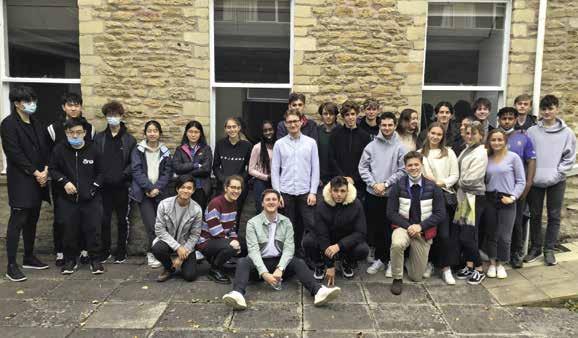
Homelessness. For several years we have based ourselves in the Catholic churches of St Nicholas Tolentino and St James. After an introductory session at Downside, reflecting briefly on two powerful passages: St Matthew’s Last Judgement and St Gregory of Nyssa on poverty in cities, we set off to Bristol and visit in small groups a few charities to see at first hand their wonderful work: the Salvation Army, the Wild Goose Café, the Sisters of the Church, Emmaus House, St Mungo’s and St Nicholas Tolentino Parish. The afternoon is spent listening to talks about Addiction and The Twelve Steps, as well as listening to testimonies from those in recovery. Given the Covid-19 restrictions, it wasn’t possible to go into Bristol but we managed to have a meaningful morning at Downside reflecting on these big issues. We were privileged to be able to invite Fr Richard McKay from St Nicholas Tolentino who spoke on Borderlands, the charity that helps and reaches out to those who need asylum, and Iona and Jack White who spoke movingly about the small charity they run – Help for the Homeless. We also listened to recorded messages from Martyn Watson of the Salvation Army, Three who are in Recovery, and we saw a moving video COVID19 and Poverty - in life on a Parish during Covid-19.
During the Lower Sixth Form retreat we learnt about the extent of poverty in the United Kingdom. I found the BBC documentary shocking as it showed some of the financial issues faced in the North of England. However, what I found more surprising was the scale of poverty in our local area; this was shown and explained to us by Iona and Jack White from the Help the Homeless charity and Father Richard McKay from Bristol. Furthermore, I found the talks from recovering addicts eye opening and insightful. The day made me understand how fortunate I am as an individual and how more needs to be done to help those in need.
Robert Keeley Lower Sixth Form – Smythe
During the Lower Sixth Form Retreat, we were fortunate enough to meet with and listen to some inspiring
people whose lives are focused around addiction and homelessness. We heard from Fr Richard McKay who runs the charity Borderlands, which supports refugees and asylum seekers Bristol-based, and Martyn Watson who runs Logos House which can house up to 93 underprivileged men. It was most interesting to hear from these two speakers as they have dedicated their lives to helping those less privileged than ourselves, which I find to be very inspirational.
Fr James spoke about The Twelve Steps programme, which helped to inform me of the way recovery is carried out with the assistance of faith. The most interesting part of the retreat was listening to the three testimonies from those in recovery. This was very moving as one of the speakers mentioned it was her first time she had told her story. I felt privileged to be able to listen to these people’s stories as it was so personal.
The Retreat helped me open my eyes to two big issues that are current in our society. The speakers showed that it is possible to help those in vulnerable positions even though sometimes it seems impossible, but what will stick with me after the retreat is the line, “You can’t help everyone, but everyone can help someone.”
Sophie Worrall Lower Sixth Form – Caverel
Fifth Form The Fifth Form retreat took place at the end of January in four online 30-minute sessions in house groups. Each group was led by the Chaplaincy and was accompanied by a member of the House. The retreat focused on mission, each pupil reflecting that he / she has a mission in life which requires opening oneself up to God’s love, trying to understand what our mission is.
The first session was about Significance: we are a person and we’re a link in a chain, as St John Henry Newman writes in his well-known prayer.
In the second session we listened to two testimonies from Old Gregorians who left in 2013, George Rawlins (R13) and Elena McFarlane (I13). They shared their faith journeys and the challenges they have had to face. Both are members of the Weave of Manquehue Prayer. George Rawlins (R13) has contributed to the little book, I have Seen the Lord. In the third session there was a lectio session from the passage from St Luke’s Gospel 4: 16-20 – Christ’s opening speech in his ministry. Pupils were encouraged to reflect in a prayerful way on Christ’s characteristics. The different themes of the three sessions were brought together in the final session. Pupils were encouraged to write a letter to themselves, thinking about where they might be in 20 years’ time, their mission in life, and what had been the challenges they had had to face, keeping in mind how their faith had strengthened them.
Fourth Form The retreat ran on similar lines to last year and was entitled Called by Name. The year group split into House groups exploring how to create a strong and loving community in the House, following the example of the House’s patron, guided by the Gospel and the Rule of Saint Benedict.
Throughout the Barlow Fourth Form Retreat, we learned about the history behind Barlow, the values behind the Downside ethos, and about faith and community. We also went for a long walk through the area surrounding Lamyatt where we found fossils from when the area was submerged by the sea, as well as the location of a ruined Roman temple. At the end of the retreat, we made acrostic poems about Barlow. What made me think differently was learning with a group of friends, and having an understanding behind Barlow and the sense of faith and community we have
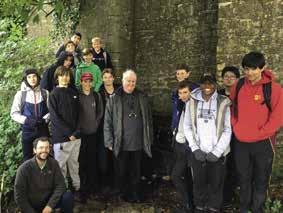
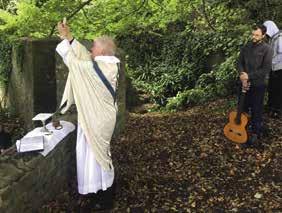
here. The retreat gave us this sense of understanding of faith and community by us all sharing our opinions and beliefs on the topic and seeing them from very different perspectives.
Yvo Mellotte Fourth Form – Barlow
Third Form Early in the term the Third Form had their retreat to begin the academic year on a spiritual note and introduce the whole year to the Gospel in their daily life, as well as some key themes in the Rule of St Benedict. The day was called Forming Community. Given the restrictions at the start of term, it was not possible to have our customary pilgrimage walk to the small church at Holcombe, so we stayed on site and walked around the games fields, reflecting on stories of refugees and migrants, finishing with games and other activities by the Cricket Pavilion.
The Experience of three pupils The retreat was an awesome opportunity to reflect and to build friendships together. During the day we took part in Lectio Divina in our tutor groups. Later on, we had a gentle walk up to the Pavilion whilst hearing about the work of CAFOD and its sister organisations abroad, helping those whose lives have been torn up by war and famine. My favourite activity was the frisbee competition because it helped build teamwork skills, but tea was just as good. From the day I think we learnt that we are all equal and of the need to reflect on ourselves and each other.
George Buhagiar Third Form – Powell
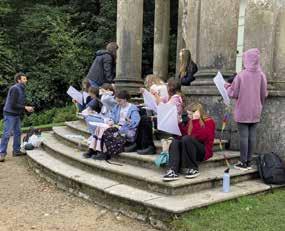
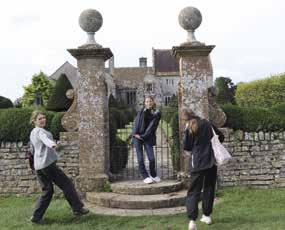
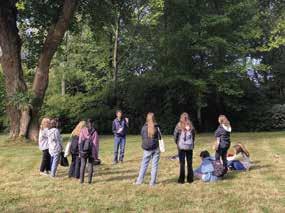
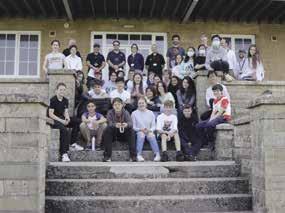
I felt like I really needed a retreat. With everything going on, all the information, school, friends, etc. I just felt the need to take a step back, and focus on what’s inside of me - all the emotions. I liked that we were outside for some of the time and were able to enjoy the wonderful weather, especially the sunshine! During Lectio Divina, I learnt how to read the Bible and try to find something that speaks to me. The theme of the retreat really spoke to me too because even though I joined Downside only three weeks ago, I already feel like a part of the community and feel that I can be myself and that I belong here.
Maria Kedzior Third Form – Isabella The Year Eight retreat was a magical day for all of us. We started off with some prayers and then went with a chaplain to reflect on God. This took up the majority of the morning but after lunch we went outside to start a reflective journey. We walked up to the pavilion and rested in several spots on the way to think about how lucky we are compared to so many people who are suffering around the world. In these stops we read a story about refugees and their struggles, and then read a prayer. When we reached the pavilion, we had tea and a frisbee competition. This was great fun and things became so competitive that one of the frisbees broke! Looking back on this very hot and sunny day spent reflecting, getting closer to God and being with friends, I would have to say my favourite part was the
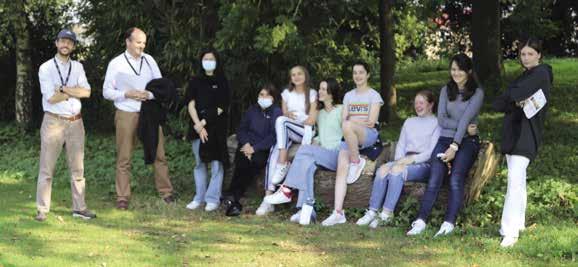
frisbee game because it created bonds between new friends and allowed us to make the most of the last few sunny days left! I also enjoyed our journey on foot up to the Pavilion as it made me think about how lucky I am and how to be the best version of myself and offer support to those around me.
Cosima Mellotte Third Form – Caverel
First and Second Forms It was not possible to spend the day away at Withan Friary, but pupils enjoyed their time reflecting on Friendship in Christ at Downside as they engaged positively in a number of activities, games, lectio and mass. The day was led by Paul Andrewartha, the Lay Chaplain, assisted by members of the St Scholastica Community and a number of pupils.
The experience of three pupils On 28th June, we had a chaplaincy retreat. We learnt about friendship, our relationship with God and about the good qualities of healthy friendships. I very much enjoyed the activities and games.
Boudica Healy – First Form
The retreat was an eye opener! I learnt much about friendship and how our friendship with Christ and our friendship with each other are so beneficial.
Cameron Colbourne – First Form We all learnt much about friendship in a really fun way. The activities were interesting and enjoyable and they taught us about teamwork and trust.
Awele Obinna-Onunkwo – Second Form
Sacraments During the year we prepared pupils for the reception of the sacraments of Baptism, First Holy Communion, Confirmation and Confession. The Bishop transferred the Confirmation ceremony to 25th June. Although many of the restrictions were still in place and it wasn’t possible to have many visitors, it was a very special occasion. The Bishop told the candidates how in many parts of the world Christians are persecuted for their faith in the risen Christ and how Christians are not afraid to express their faith openly despite the hostility they encounter. In the sacraments of
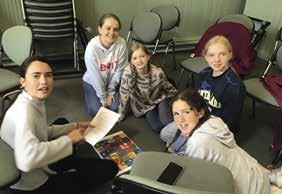
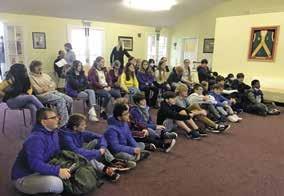
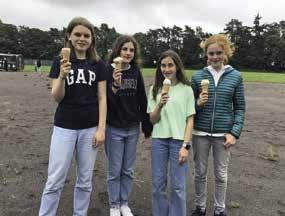
baptism and confirmation candidates make a public declaration of their faith and reject sin. Although these sacraments are received once, all who are baptised and confirmed are called to renew that commitment on daily; this is done by prayer and the regular reception of the sacraments of confession and communion. At the mass on 29th June, the feast of Saints Peter and Paul, three pupils made their first Holy Communion.
Pilgrimages Given the current situation, the OMV Lourdes Pilgrimage in July has been cancelled. It is very much hoped that this will take place in Summer 2022 with a group of pupils and young Old Gregorians. However, it was possible to take part in a more local pilgrimage to Glastonbury at the end of term as part of the Three Days In June activities. The small group of pupils and staff reflected on what it is to be a pilgrim and why people go on pilgrimage. All enjoyed watching the well-known film, The Way. We were fortunate to have a dry and sunny day for the 17-mile walk to Glastonbury, as we stopped at the churches of Ashwick, Croscombe and Dinder and reflected on passages from St Mark’s Galilean Ministry. The long road on the Somerset levels close to Glastonbury was the ideal location for the recitation of the Rosary and the singing of the Salve Regina. The third day was spent putting together a power point talk for the small local primary school at Kilmerston.
Other Devotions Early on in the year Daniel McLean, the House Master of Roberts, refounded the Sodality of Our Lady. The members gathered every week in the Old Chapel to recite the Rosary. During the year we had two masses, and it was a pleasure to invite Fr Rupert Allen of the Clifton Diocese to preach to the Sodality on the Vigil of the feast of St John the Baptist.
During the Lent Term the First and Second Form put together very moving reflections of the Stations of the Cross in the Theatre. Other year groups reflected on some of the Stations online.
We were able to invite pupils in Advent and Lent to take part in Night Fever. Pupils dropped into the Old Chapel to pray in front of the Blessed Sacrament.
The academic year brought several new challenges, but it’s been heartening to see how well pupils have responded and how many have continued to open their hearts to God’s love. The School has had to adapt to new and different ways of encountering the Lord. I thank the Head, the Deputy Head, the Director of Pastoral Care and the Director of Studies who have continued to assist and facilitate the ways in which the chaplaincy functions. I also thank the House Masters and Mistresses for their continued support. It has been difficult to visit the Houses and join them in prayer at evening assemblies. Fr Boniface has continued to assist with the sacramental life, saying the early morning Old Chapel masses and helping with the House Masses, reconciliation services and the visits to the Houses. I thank Mr Paul Andrewartha, the Lay Chaplain, for coping so well with the many changes and the increased administration this has involved. The St Scholastica Community have continued to assist pupils in their spiritual journeys as they guide, lead and teach them to open their hearts to God’s Word. I’ve been impressed with the spiritual leadership of the senior pupils. I wish the leavers the very best in the future and pray that they will continue to open their hearts to God’s love. I can do no better than conclude with words from the Acts of the Apostles where St Luke gives us a picture of the first Christian Community in Jerusalem:
“Each day, with one heart, they regularly went to the Temple but met in their houses for the breaking of the bread; they shared their food gladly and generously; they praised God and were looked up to by everyone. Day by day the Lord added to their community those destined to be saved.” (Acts 2:46-47)
Dom James Hood Chaplain
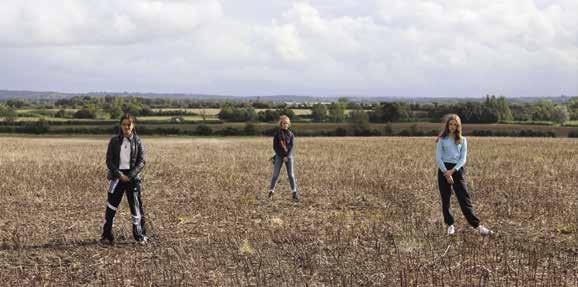

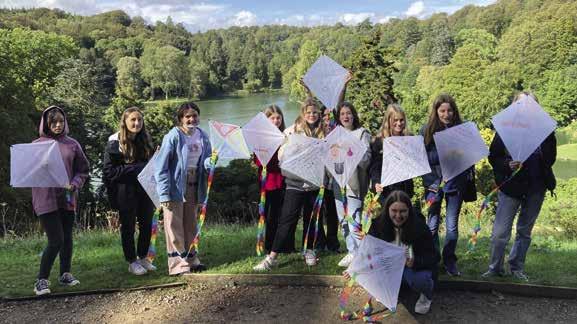
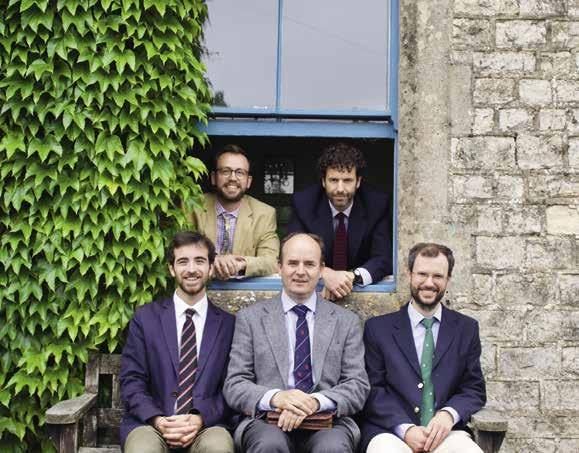
ST SCHOLASTICA COMMUNITY – MANQUEHUE AT DOWNSIDE
St Scholastica is a community of the Manquehue Apostolic Movement that has been living and working at Downside since 2015. This Movement is a lay Benedictine community based in Chile whose life springs from Lectio Divina - the prayerful reading of Scriptures - and friendship. Manquehue runs three schools in Santiago, with a total of 4500 students, and a Formation House for young people in Patagonia.
At Downside we share friendship, liturgy, and a mission with the Monastic Community. In the School we work as part of the Chaplaincy developing a program of tutoría and Lectio Divina among the students. Tutoría is a way of helping older students engage pastorally with younger students, forming friendships and sharing their own experience of prayer and service. Beyond Downside, St Scholastica is at the heart of The Weave of Manquehue Prayer, a network of friends who seek to help one another to pray and to share with many the Good News of the Gospel. The Weave was started among old students from Downside, Ampleforth, Worth and those having visited the Manquehue Movement in Chile. Today the Weave connects people and Lectio Groups across the UK.
Cristóbal Valdés, Nicolás Meneghello and Vicente Tagle are the three permanent members of St Scholastica. They are Manquehue Oblates which means that they have a life-long commitment to Manquehue. The pandemic meant that no younger Chileans were able to join St Scholastica during this academic year, but two old Amplefordians have stayed with the community. Marcus Emmet joined the life and mission of St Scholastica from early January to the end of June. Christian Laczko-Schroeder came for six weeks beginning in early June.
During this very particular academic year, the work of St Scholastica in the School has focused on St John’s Community which is the Lectio Leaders’ lectio and formation group. We have met in the ways we can: online, in the Theatre and even outdoors by a fire. St Teresa’s, the Service Leaders’ group, has met in similar circumstances. Year groups as bubbles have challenged tutoría from older to younger pupils, but Lectio Groups have managed to continue in many creative ways. A highlight of the year was Light your Lockdown in February, when St John’s invited the whole School community to come together for an online Celebration of the Word.
The Weave of Manquehue Prayer has continued its mission with online visits to Lectio groups and retreats, marking the different liturgical times of the year such as Advent, Lent and Easter. Frequent surprises have come up with the online format, memorably the Lectio Leaders’ Workshop in January being attended by 60 people from all over the world. The Feast of Christ the King and the Holy Triduum were planned as offline retreats, with booklets posted for people to join in prayer. I have seen the Lord was published before Christmas, including testimonies of current and former students and their encounters with the Risen Christ. Towards the end of the academic year, gradual easing of Covid regulations have allowed St Scholastica to resume both receiving guests and visiting groups in person.







